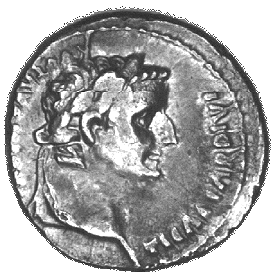 Contents --
Previous Article --
Next Article
Contents --
Previous Article --
Next Article
""Render therefore unto Caesar what is Caesar's, and to God what is God's""
Again, the reference to a Roman emperor in the Bible has brought everlasting fame to a man who otherwise might be almost forgotten in history. The coin to the right is a denarius of Tiberius and it is highly probable that this is the denarius brought to Jesus by his disciples. It is referred to as a "Tribute Penny" by collectors today. The woman is Livia, Tiberius' mother.
Tiberius was not as well liked as his father Augustus or Julius Caesar were. In fact, he has a rather sinister reputation in history as a suspicious man, always afraid of plots against his life by senators or popular rivals. It is rumored that he had a part in the death of his very popular stepbrother Germanicus. Germanicus was popular with the army and had won many victories in battle against German tribesmen.
In the latter part of his reign, Tiberius moved to the island of Capri, out of touch with Rome but still emperor. Much of the governing was done by his powerful Praetorian Prefect Sejanus. When Sejanus later tried to plot against Tiberius in hopes of gaining the throne for himself, Tiberius had him tried by the Senate for treason. After Sejanus was convicted, Tiberius had him as well as many of his friends and family members executed. Tacitus uses his typically graphic and descriptive writing style to go into the bloody details of this scandal in his Annals, which should prove to be of interest to those who love gruesome stories.
Tiberius became increasingly paranoid about plots against his life in later years. He had many powerful men tried and convicted in the Senate for treason. These were exiled, ordered to commit suicide, or executed. The senators had become so fearful of these trials that hardly anybody mourned the death of Tiberius of old age in A. D. 37.
Many of the Roman emperors, including Tiberius, lived in paranoid fear for their lives. Domitian, Commodus and Caius were some of the more famous examples. They often went to great lengths to protect themselves, including having hundreds of innocent people murdered just because they were seen as a threat to the emperorís life.
Go to next article on Germanicus
Go back to previous article on Agrippa